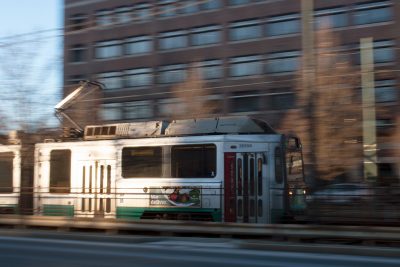
Boston City Councilor Michelle Wu released a petition last week protesting proposed increases to fare prices for the Massachusetts Bay Transportation Authority.
Wu’s petition calls for the creation of a free youth and senior pass and the establishment of a new, reduced fare for lower-income riders. The petition states increased costs would only push more riders off the T, which would increase congestion and worsen greenhouse gas emissions.
“We are running out of time to transform our economy and society in the face of climate change, and the Greater Boston region is now confronted with the worst traffic in the nation,” Wu’s petition states. “The proposed fare increase represents a step in the wrong direction when we can’t afford anything less than aggressive progress forward.”
The planned increases, announced Jan. 28, would increase prices by an average of 6.3 percent. Charlie Card bus fares will rise from $1.80 to $1.90, and T fares will go up from $2.25 to $2.40, according to the MBTA. Commuter Rail prices would also increase, depending on the rider’s distance from Boston.
In total, the fare increases are projected to raise around $32 million dollars in 2020 and would be implemented on July 1, 2019, according to the MBTA.
Matt Lawlor is a member of WalkUP Roslindale, which is an organization that advocates for Roslindale to be pedestrian-friendly, and he’s also a co-sponsor of Wu’s petition. Lawlor said the petition’s goal was to “take the conversation in a different direction” and push the MBTA to prioritize taking small steps to making public transportation free for everyone.
“The T’s focus right now is to approach the question as, ‘Why they need the fare increase?’,” Lawlor said. “I think the petition that Councilor Wu is proposing reframes the questions as to why we should be encouraging ridership in the T rather than discouraging it.”
The MBTA stated that the proposed rate hikes are in line with both state guidelines and economic inflations — citing the need for funding various projects aimed at improving service and quality, according to the 2019 Fare Increase Proposal.
“Industry best practice is modest increases at regular intervals,” the proposal states. “The MBTA continues to focus on own-source revenue and cost controls, the proposal is consistent with inflation in the Boston area over the past 3 years, and it supports equitable compensation for our workforce.”
However, Lawlor said while he’s confident the increased fares would decrease ridership on the T, there’s no guarantee the higher prices would significantly improve riders’ experiences.
“[The MBTA is] hoping that improvements in service are going to come from the realignments they’re doing around bus service as well as new cars on the orange line are going to help mitigate some of that,” Lawlor said. “But there’s not a lot of belief that that’s exactly how it’s going to play out.”
Lawlor said alternate funding could come from various sources, which include increasing the gas tax and levying greater fees on ride-sharing services such as Uber and Lyft.
Rickie Harvey, the chair of West Roxbury Saves Energy — which also co-sponsored the petition — wrote in an email that in order to combat the “ravages” of climate change, Boston needed to take decisive action toward simultaneously addressing social injustice and reducing greenhouse gas emissions.
“WRSE doesn’t claim to know what all the answers are to the crisis we are confronting,” Harvey wrote, “but we do know that without bold ideas, bold leadership, and the political will to take bold steps right now by elected officials such as Councilor Wu, we have no chance at all of meeting the challenge.”
In order to avert “unthinkable disaster,” people need to reduce greenhouse gas emissions — and the transit system is a good place to start, according to James Michel. Michel co-founded the Boston Clean Energy Coalition and also co-sponsored the petition.
“We know that a system which encourages public transportation over a massive fleet of individual vehicles is part of the solution, along with electrification of all vehicles,” Michel wrote in an email. “Paying for public transportation from the general fund properly emphasizes the public benefit of the system.”
Scott Cobban, 37, of Brookline, said he is not worried about the fare increase personally and supports the MBTA’s intention to better its services. However, he understands portions of the population would suffer from the rising prices.
“I think every time there is a fare increase, there is a percentage of the population that isn’t able to continue to use the services on a regular basis,” Cobban said, “and I imagine that is the population that is relying on these services, so I’m torn on the idea.”
Brighton resident Sarah O’Reilly, 28, said she supports Wu’s initiative because it would open public transportation to those who need it the most.
“Especially in a growing city with increasing rents and a greater difficulty of maintaining a certain standard of living,” O’Reilly said, “having free public transportation is necessary in creating greater equity for people to access schooling, living situation and unfortunately the multiple jobs that people need to make a living in this city.”
Katelyn Noyes, 27, of Allston, said while she was optimistic the proposed increases would go toward improving service, she said she thought that the T did not have a good track record with previous rate hikes.
“They said last time when they raised [the fares] that they were going to make lots of improvements, but I haven’t seen many of those improvements,” Noyes said, “so if they raise it, hopefully something good comes out of it.”


















































































































